21世纪大学英语读写教程
- 格式:pptx
- 大小:680.49 KB
- 文档页数:72
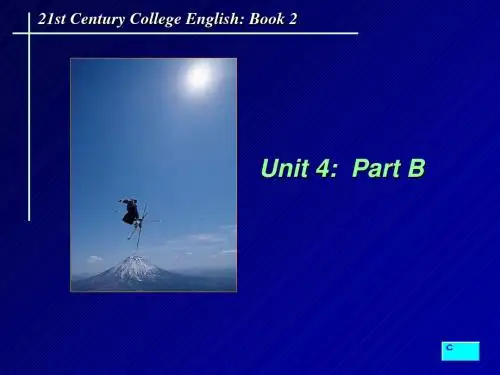
![全新版21世纪大学英语读写教程3Unit1-Unit7课文翻译[整理版]](https://uimg.taocdn.com/98335bb6294ac850ad02de80d4d8d15abf23005a.webp)
Unit1 赞美之词的魔力1、一次,一位百老汇喜剧演员做了一个噩梦:他梦见自己在一个座无虚席的剧场里讲故事、唱歌,数以千计的人们看着他—但是没有人笑或拍手。
“即使一个星期能赚10万美元,”他说,“那也像人间地狱一般。
”2、不仅演员需要掌声,没有赞扬和鼓励,任何人都会失去信心。
因此,我们都有着双重需求:被别人称赞以及懂得如何去称赞别人。
说赞美的话是有技巧的,有正确的说法。
比如,因为某些显而易见的成就而去表扬一个人,这不是真正的赞扬。
你得运用辨别力和创造力。
“您今晚的演讲很精彩、很有说服力,”一次,一位和蔼可亲的女士对一位商人说,“我禁不住想,您肯定也能当一名出色的律师。
”听到这意外的溢美之词,那位商人像个男生般地脸红了。
3、无论声名显赫还是默默无闻,没有一个人会对真诚的赞赏无动于衷。
耶鲁著名的英语教授威廉·里昂·费尔普斯讲述道:“一个炎热的夏日,我走进一家拥挤的饭馆吃中饭。
服务员递给我菜单时,我说,‘今天厨房里的小伙子们肯定在受罪!’服务员惊讶地看着我说:‘来这儿的人都抱怨菜的味道不好,对服务评头论足,还埋怨太闷热。
19年了,你是第一个对后面厨房里的厨师们表示同情的人。
’人们所需要的,”费尔普斯下结论道,“是作为人能得到一点点关注。
”在那种关注中,真诚是至关重要的。
当劳作了一天的男人回家时看见孩子们将脸贴在窗上、张望着等待他,他也许会感到这种无声而珍贵的语言如甘露一般涤荡了他的心灵。
4、孩子们尤其渴望鼓励。
童年时如果得不到善意的赞赏,将会危及性格的发展。
一位年轻妈妈向A·W·比文牧师讲述了一件让人伤心的事:“我的小女儿常常不听话,我不得不批评她。
但是有一天,她特别乖,没有做一件会挨批评的事。
当天晚上,我给她盖好被子、准备下楼时,听见她在抽泣。
我走回去,发现她把头埋在枕头里。
她一边呜咽一边问:‘难道我今天还不够乖吗?’”5、“那个问题,”那位妈妈说,“像把刀一样刺痛了我。
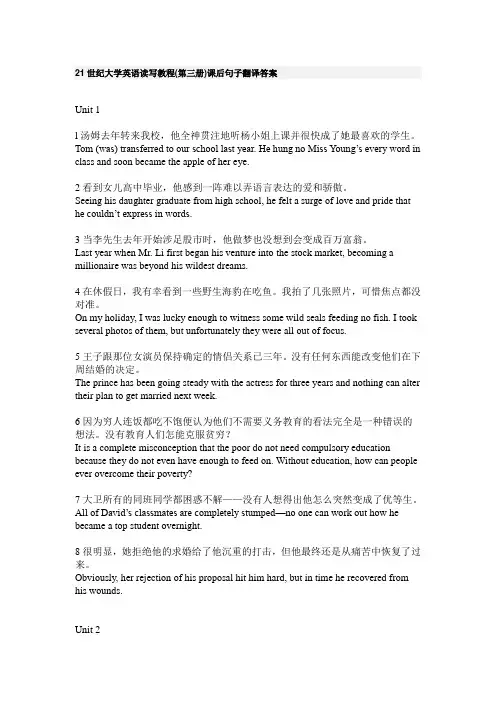
21世纪大学英语读写教程(第三册)课后句子翻译答案Unit 1l汤姆去年转来我校,他全神贯注地听杨小姐上课并很快成了她最喜欢的学生。
Tom (was) transferred to our school last year. He hung no Miss Young’s every word in class and soon became the apple of her eye.2看到女儿高中毕业,他感到一阵难以弄语言表达的爱和骄傲。
Seeing his daughter graduate from high school, he felt a surge of love and pride that he couldn’t express in words.3当李先生去年开始涉足股市时,他做梦也没想到会变成百万富翁。
Last year when Mr. Li first began his venture into the stock market, becoming a millionaire was beyond his wildest dreams.4在休假日,我有幸看到一些野生海豹在吃鱼。
我拍了几张照片,可惜焦点都没对准。
On my holiday, I was lucky enough to witness some wild seals feeding no fish. I took several photos of them, but unfortunately they were all out of focus.5王子跟那位女演员保持确定的情侣关系已三年。
没有任何东西能改变他们在下周结婚的决定。
The prince has been going steady with the actress for three years and nothing can alter their plan to get married next week.6因为穷人连饭都吃不饱便认为他们不需要义务教育的看法完全是一种错误的想法。
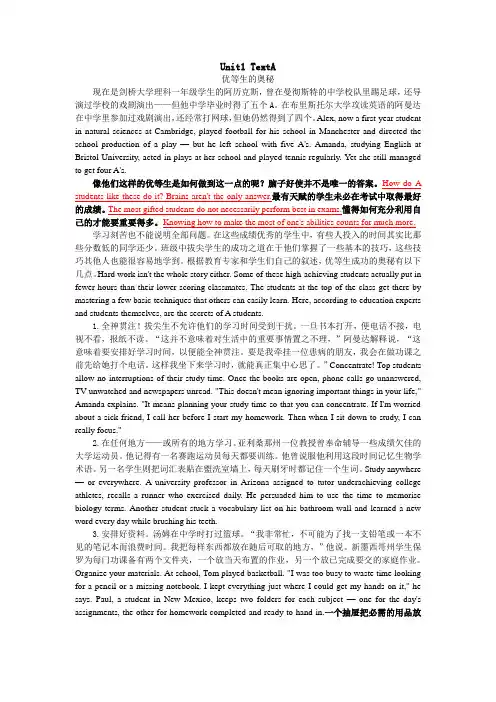
Unit1 TextA优等生的奥秘现在是剑桥大学理科一年级学生的阿历克斯,曾在曼彻斯特的中学校队里踢足球,还导演过学校的戏剧演出——但他中学毕业时得了五个A。
在布里斯托尔大学攻读英语的阿曼达在中学里参加过戏剧演出,还经常打网球,但她仍然得到了四个。
Alex, now a first-year student in natural sciences at Cambridge, played football for his school in Manchester and directed the school production of a play —but he left school with five A's. Amanda, studying English at Bristol University, acted in plays at her school and played tennis regularly. Yet she still managed to get four A's.像他们这样的优等生是如何做到这一点的呢?脑子好使并不是唯一的答案。
How do A students like these do it? Brains aren't the only answer.最有天赋的学生未必在考试中取得最好的成绩。
The most gifted students do not necessarily perform best in exams.懂得如何充分利用自己的才能要重要得多。
Knowing how to make the most of one's abilities counts for much more.学习刻苦也不能说明全部问题。
在这些成绩优秀的学生中,有些人投入的时间其实比那些分数低的同学还少。
班级中拔尖学生的成功之道在于他们掌握了一些基本的技巧,这些技巧其他人也能很容易地学到。
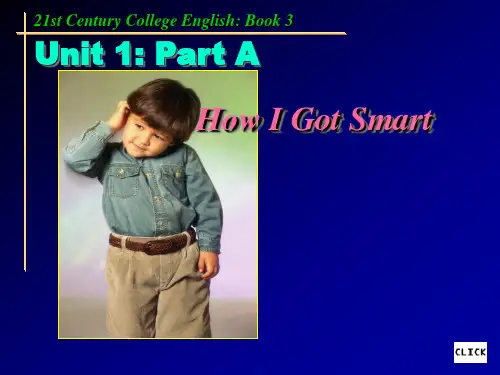
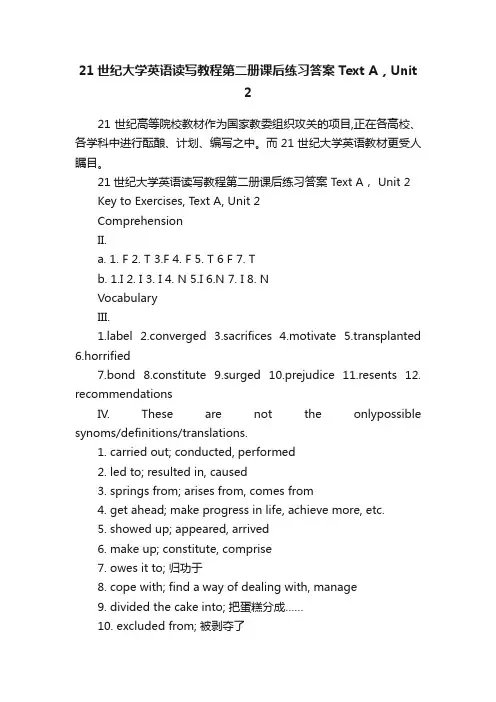
21世纪大学英语读写教程第二册课后练习答案 Text A,Unit221世纪高等院校教材作为国家教委组织攻关的项目,正在各高校、各学科中进行酝酿、计划、编写之中。
而21世纪大学英语教材更受人瞩目。
21世纪大学英语读写教程第二册课后练习答案 Text A, Unit 2 Key to Exercises, T ext A, Unit 2ComprehensionII.a. 1. F 2. T 3.F 4. F 5. T 6 F 7. Tb. 1.I 2. I 3. I 4. N 5.I 6.N 7. I 8. NVocabularyIII.bel2.converged3.sacrifices4.motivate5.transplanted6.horrified7.bond 8.constitute 9.surged 10.prejudice 11.resents 12. recommendationsIV. These are not the onlypossible synoms/definitions/translations.1. carried out; conducted, performed2. led to; resulted in, caused3. springs from; arises from, comes from4. get ahead; make progress in life, achieve more, etc.5. showed up; appeared, arrived6. make up; constitute, comprise7. owes it to; 归功于8. cope with; find a way of dealing with, manage9. divided the cake into; 把蛋糕分成……10. excluded from; 被剥夺了11. committed to; devoted to, dedicated to12. make it to; arrive at or on after much effortV.1. sense of guilt2. finally3. imbued herwith4.offspring5. horrified, motivated me6.recommendations, To start with7. naïve 8. bycontrastWord BuildingVI.1. misplaced2.mismatched3. misusing4. mislead5. misprinted6. misinformed7. misspelled8. misunderstoodStructureVII.7. after the earthquake the government spent millions of dollarsto help the victims rebuild their houses.8. will you reconsider your decision? No one wants you to leave.9. Some of Lu Xun’s writings were lost for decades, but they wererediscovered in the mid-80s.10. I see no need to restate the policy on late homework.11. The library’s been rearranged, and I can’t find any of the books Ineed.12. I hope this dictionary will be reprinted soon—I’d like to buyone.13. Stevie Wonder’s ear liest albums have been unavailable forseveral years, but they’re being re-released next month.14. I didn’t care much for the book the first time, but I enjoyedit when I reread it.15. John Harding is best known for reinterpreting Shakespeare’splays.16. You’ve misunderstood me—let me rephrase what I said.VIII.A. gardener calculator receiver container commander remainder hikeinspector steamer processor supervise builder contributorconsumer paint teenagerB.1.superviser 2. inspector 3. remainder 4. processor5.gardener6.calculator7. commander8. container9. hiking 10.teenagers。
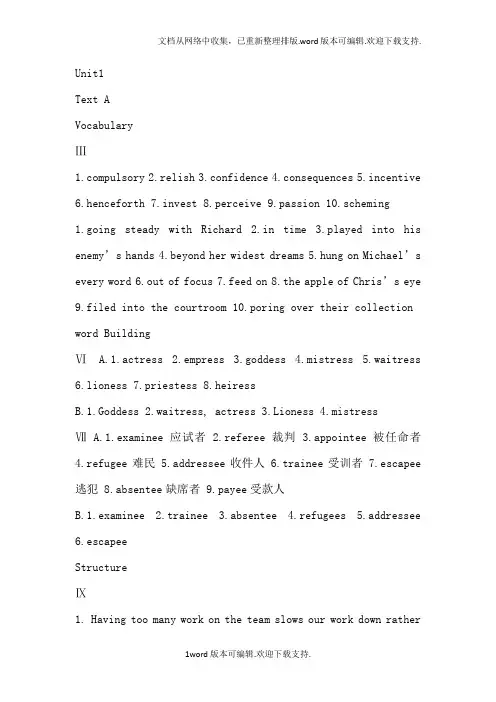
Unit1Text AVocabularyⅢpulsory2.relish3.confidence4.consequences5.incentive6.henceforth7.invest8.perceive9.passion 10.scheming1.going steady with Richard2.in time3.played into his enemy’s hands4.beyond her widest dreams5.hung on Micha el’s every word6.out of focus7.feed on8.the apple of Chris’s eye9.filed into the courtroom 10.poring over their collection word BuildingⅥ A.1.actress 2.empress 3.goddess 4.mistress 5.waitress6.lioness7.priestess8.heiressB.1.Goddess 2.waitress, actress 3.Lioness 4.mistressⅦ A.1.examinee应试者 2.referee裁判 3.appointee被任命者4.refugee难民 5.addressee收件人 6.trainee受训者 7.escapee 逃犯 8.absentee缺席者 9.payee受款人B.1.examinee 2.trainee 3.absentee 4.refugees 5.addressee6.escapeeStructureⅨ1. Having too many work on the team slows our work down ratherthan speeding it up .2. He wanted to make his living as a teacher rather than as a businessman.3. In most modern societies women are treated as professorial equal rather than as servants.4. “Body language” refers to communication through the way you move rather thant to speech.5. He preferred to sit quietly in class rather than risking giving an answer that might be wrong .6. Andrew is convinced that love rather than money is the key to happiness.7. Many people nowadays communicate by email rather thanby phones and faxes.8. Mrs.Kester made students think for themselves rather than telling them what to think.Ⅹ1. if only to attract more readers.2. 2.if only to get his two teeth filled.3. if only to make a good impression on his girlfriend.4. if only to teach him a lesson on how dangerous it is to be so careless.5. if only to stop yourself getting so bored at home.TranslationⅫ正在上学的孩子们中有一种普遍的错误观念,即他们的老师们曾是些神童。
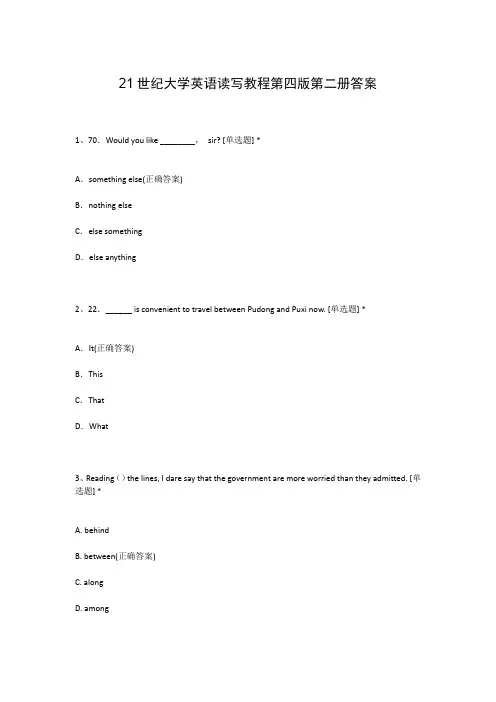
21世纪大学英语读写教程第四版第二册答案1、70.Would you like ________,sir? [单选题] *A.something else(正确答案)B.nothing elseC.else somethingD.else anything2、22.______ is convenient to travel between Pudong and Puxi now. [单选题] *A.It(正确答案)B.ThisC.ThatD.What3、Reading()the lines, I dare say that the government are more worried than they admitted. [单选题] *A. behindB. between(正确答案)C. alongD. among4、Our school is beautiful. How about _______? [单选题] *A. theirs(正确答案)B. theirC. theyD. them5、What _______ would you like, sir? [单选题] *A. otherB. else(正确答案)C. othersD. another6、She talks too much; you’ll be glad when you’re free of her. [单选题] *A. 与她自由交谈B. 离开她(正确答案)C. 受她的控制D. 与她在一起7、Bob is young, _______ he knows a lot. [单选题] *A. becauseB. soC. but(正确答案)D. unless8、3.Shanghai is my hometown. It’s ________ China. [单选题] *A.nearB.far away fromC.to the east ofD.in the east of(正确答案)9、The house was completed five months ago. [单选题] *A. 完成(正确答案)B. 复杂C. 开始D. 装着10、During the Spring Festival, people in Northern China usually eat _______ as a traditional Chinese food. [单选题] *A. pizzaB. dumplings(正确答案)C. hamburgersD. noodles11、—Does your grandpa live ______ in the country?—Yes. So I often go to visit him so that he won’t feel ______. ()[单选题] *A. alone; aloneB. lonely; lonelyC. lonely; aloneD. alone; lonely(正确答案)12、Online shopping _______ very popular now. [单选题] *A. is(正确答案)B. areC. wasD. were13、You should stick to your()and tell him you won' t do the thing. [单选题] *A. principle(正确答案)B. qualityC. contactD. influence14、26.There’s some fruit in the kitchen. We ________ buy any. [单选题] *A.need toB.needn’t toC.don’t needD.don’t need to(正确答案)15、Nobody noticed the thief slip into the shop, because the lights happened to _______. [单选题] *A. put outB. turn outC. give outD. go out(正确答案)16、( ) What other books have you read___ this English novel? [单选题] *A. besides(正确答案)B. exceptC.inD. about17、33.Will Mary's mother ______ this afternoon? [单选题] *A.goes to see a filmB.go to the filmC.see a film(正确答案)D.goes to the film18、Every morning John takes a()to his office. [单选题] *A. 20-minutes' walkB. 20 minute ' walkC. 20-minutes walkD. 20-minute walk(正确答案)19、一Mary wants to invite you to see the movie today. 一I would rather she(B)me tomorrow. [单选题] *A.tellsB. told (正确答案)C. would tellD. had told20、We ______ to set up a food bank to help hungry people next week.()[单选题] *A. hadB. are going(正确答案)C. were goingD. went21、Either you or the president()the prizes to these gifted winners at the meeting. [单选题] *A. is handing outB. are to hand outC. are handing outD. is to hand out(正确答案)22、A lot of students in our school were born _______ March, 1 [单选题] *A. in(正确答案)B. atC. onD. since23、_____ the plan carefully,he rejected it. [单选题] *A. To have consideredB.To considerC. Having considered(正确答案)D. Considering24、Last week they _______ in climbing the Yuelu Mountain. [单选题] *A. succeeded(正确答案)B. succeedC. successD. successful25、We need some green paint badly, but there' s _____ at hand. [单选题] *A. notB. nothingC. little(正确答案)D. none26、The weather forecast says that we’ll have occasional rain tomorrow. [单选题] *A. 偶尔的B. 不停的C. 少量的(正确答案)D. 不可预测的27、He runs so fast that no one can _______ him. [单选题] *A. keep upB. keep awayC. keep up with(正确答案)D. keep on28、Lucy _______ at 7:00 every day. [单选题] *A. go to schoolB. goes to school(正确答案)C. to go to schoolD. went?to?school29、Last year Polly _______ an English club and has improved her English a lot. [单选题] *A. leftB. sawC. joined(正确答案)D. heard30、John is fond of playing _____ basketball and Jack is keen on playing _____ piano. [单选题] * A./…the(正确答案)B.the…/C./…/D.the…the。
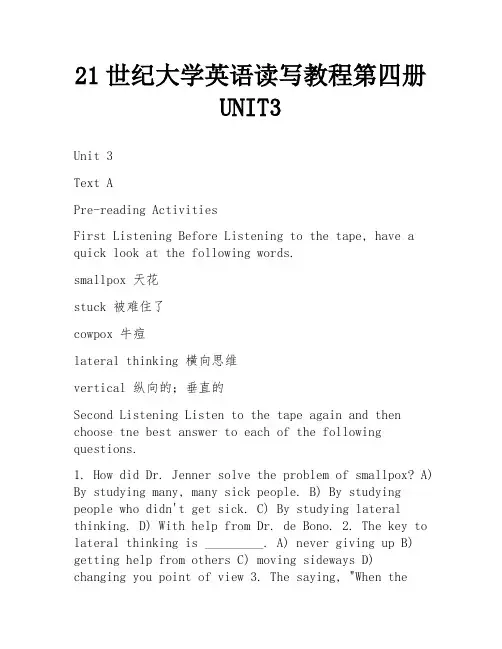
21世纪大学英语读写教程第四册UNIT3Unit 3Text APre-reading ActivitiesFirst Listening Before Listening to the tape, have a quick look at the following words.smallpox 天花stuck 被难住了cowpox 牛痘lateral thinking 横向思维vertical 纵向的;垂直的Second Listening Listen to the tape again and then choose tne best answer to each of the following questions.1. How did Dr. Jenner solve the problem of smallpox? A) By studying many, many sick people. B) By studying people who didn't get sick. C) By studying lateral thinking. D) With help from Dr. de Bono.2. The key to lateral thinking is _________. A) never giving up B) getting help from others C) moving sideways D) changing you point of view3. The saying, "When thegoing gets tough, the tough get going" expresses________. A) the aggressive attitude of vertical thinking B) traditionally western lateral thinking C) a way to change your point of view D) how Edward de Bono likes to solve problems 4. The main purpose of this passage is ________. A) to discuss a major medical breakthrough B) to introduce a new concept of problem solving C) to talk about the life of Edward de Bono D) to contrast Eastern and Western ways of thinkingHow to Change Your Point of ViewCaroline SeebohmDr. Edward Jenner was busy trying to solve the problem of smallpox. After studying case after case, he still found no possible cure. He had reached an impasse in his thinking. At this point, he changed his tactics. Instead of focusing on people who had smallpox, he switched his attention to people who did not have smallpox. It turned out that dairymaids apparently never got the disease. From the discovery that harmless cowpox gave protection against deadly smallpox came vaccination and the end of smallpox as a scourge in the western world. We often reach an impasse in our thinking. We are looking at a problem and trying to solve it and it seems there is a dead end. It is on these occasions that we bee tense, we feel pressured, overwhelmed, in a state of stress. We struggle vainly, fighting to solve the problem. Dr. Jenner, however, did something about this situation.He stopped fighting the problem and simply changed his point of view—from his patients to dairy maids. Picture the process going something like this: Suppose the brain is a puter. This puter has absorbed into its memory bank all your history, your experiences, your training, your information received through life; and it is programmed according to all this data. To change your point of view, you must reprogramme your puter, thus freeing yourself to take in new ideas and develop new ways of looking at things. Dr. Jenner, in effect, by reprogramming his puter, erased the old way of looking at his smallpox problem and was free toreceive new alternatives. That's all very well, you may say, but how do we actually do that? Doctor and philosopher Edward de Bono has e up with a techniquefor changing our point of view, and he calls itLateral Thinking. The normal Western approach to a problem is to fight it. The saying, "When the going gets tough, the tough get going," is typical of this aggressive attitude toward problem-solving. No matter what the problem is, or the techniques available for solving it, the framework produced by our Western way of thinking is fight. Dr. de Bono calls this vertical thinking; the traditional, sequential, Aristotelian thinking of logic, moving firmly from one step to the next, like toy blocks being built one on top of the other. The flaw is, of course, that if at any pointone of the steps is not reached, or one of the toy blocks is incorrectly placed, then the whole structure collapses. Impasse is reached, and frustration, tension, feelings of fight take over. Lateral thinking,Dr. de Bono says, is a new technique of thinking about things—a technique that avoids this fight altogether, and solves the problem in an entirely unexpected fashion. In one of Sherlock Holmes's cases, his assistant, Dr. Watson, pointed out that a certain dog was of no importance to the case because it did not appear to have done anything. Sherlock Holmes took the opposite point of view and maintained that the fact the dog had done nothing was of the utmost significance, for it should have been expected to do something, and on this basic he solved the case. Lateral thinking sounds simple. And it is. Once you have solved a problem laterally, you wonder how you could ever have been hung up on it. The key is making that vital shift in emphasis, that sidestepping of the problem, instead of attacking it head-on. Dr. A. A. Bridger, psychiatrist at Columbia University and in private practice in New York, explains how lateral thinking works with his patients. "Many people e to me wanting to stop smoking, for instance," he says. "Most people fail when they are trying to stop smoking because they wind up telling themselves, 'No, I will not smoke; no, 1 shall not smoke; no, I will not; no, I cannot...' It's a fight and what happens is you end up smoking more." "So instead of looking at the problem from the old ways of no, and fighting it, I show them a whole new point of view—that you are your body's keeper, and your body is something through which you experience life. If you stop to think about it, there's really something helpless about your body. It can do nothing for itself. It has no choice, it islike a baby's body. You begin then a whole new way of looking at it—‘I am now going to take care of myself, and give myself some respect and protection, by not smoking.' “There is a Japanese parable about a donkey tied to a pole by a rope. The rope rubs tight against his neck. The more the donkey fights and pulls on the rope, the tighter and tighter it gets around his throat—until he winds up dead. On the other hand, as soon as he stops fighting, he finds that the rope gets slack, he can walk around, maybe find some grass to eat...That's the same principle: The more you fight something the more anxious you bee—the more you're involved in a bad pattern, the more difficult it is to escape pain. "Lateral thinking," Dr. Bridger goes on, "is simply approaching a problem with what I wouldcall an Eastern flanking maneuver. You know, when azen archer wants to hit the target with a bow and arrow, he doesn't concentrate on the target, he concentrates rather on what he has in his hands, so when he lets the arrow go, his focus is on the arrow, rather than the target. This is what an Easternflanking maneuver implies—instead of approaching the target directly, you approach it from a sideways point of view—or laterally instead of vertically." "I think the answer lies in that direction," affirms Dr. Bridger. "Take the situation where someone is in a crisis. The Chinese word for crisis is divided intotwo characters, one meaning danger and the other meaning opportunity. We in the Western world focusonly upon the ‘d anger' aspect of crisis. Crisis in Western civilization has e to mean danger, period. Andyet the word can also mean opportunity. Let us now suggest to the person in crisis that he cease concentrating so upon the dangers involved and the difficulties, and concentrate instead upon the opportunity—for there is always opportunity in crisis. Looking at a crisis from an opportunity point of view is a lateral thought." (1 100 words)New Wordssmallpox n. a highly contagious disease causing spots which leave marks on the skin 天花impasse n. a position from which progress is impossible; deadlock 僵局;死胡同tactics n. a method or process of carrying out a scheme or achieving some end 战术;策略dairymaid n. a girl or woman who works in a dairy 牛奶场女工dairy n. 1. place where milk is kept and milk products are made 牛奶场;奶品场 2. shop where milk, butter, etc. are sold 乳品店cowpox n. a disease of cows, of which the virus was formerly used in vaccination against smallpox 牛痘vaccination n. 接种疫苗scourge n. thing or person that causes great troubleor misfortune 苦难的根源;灾难;祸害dead end n. a point beyond which progress or achievement is impossible; a street or passage closed at one end 僵局;死巷,死胡同vainly ad. uselessly; in vain 枉然地;徒劳地vain a. 1. having too high an opinion of one's looks, abilities, etc.; conceited 自视甚高的;自负的 2. useless or futile 无用的,无益的,无效的;徒劳的erase vt. rub out; remove all traces of 擦掉;抹去lateral a. of, at, towards, or from the side or sides 横向的;侧面的;向侧面的laterally ad. in a lateral direction, sideways 横向地;侧面地;旁边地lateral thinking 横向思维,水平思考going n. 1. the condition of the ground for walking, driving or riding 地面状况 2. condition of progress 进行情况;进展framework n. 1. set of principles or ideas used as a basis for one's judgement, decisions, etc. 参照标准;准则;观点 2. structure giving shape and support 框架,结构vertical a. straight up and down; at right angles to a horizontal plane 纵向的;垂直的vertically ad. in a vertical direction 垂直地sequential a. of, forming, or following in (a) sequence 相继的;连续的flaw n. a defect; fault; error 瑕疵;缺点structure n. sth. built; anything posed of parts arranged together; way in which sth. is put together, organized, built, etc. 结构;建筑物;构造物utmost a. greatest; highest 极度的;极高的significance n. importance; meaning 重要性;意义,含义sidestep v. step aside; avoid by stepping aside 横跨一步避开;回避head-on ad. in a direct manner; with the head or front first 正面地;迎头向前地parable n. a brief story used to teach some moral lesson or truth 寓言donkey n. 驴slack a。
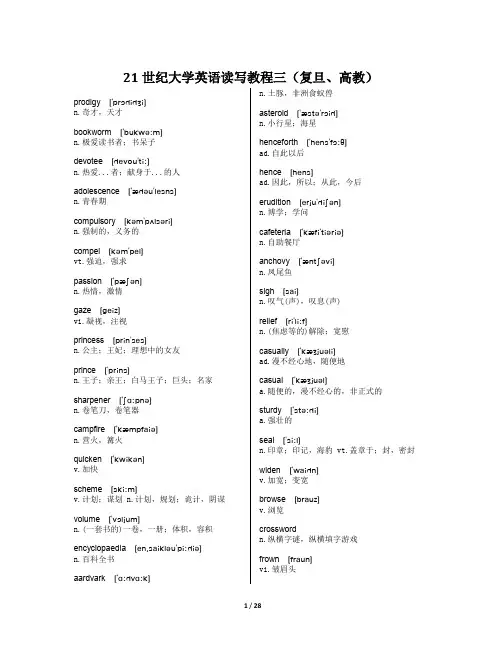
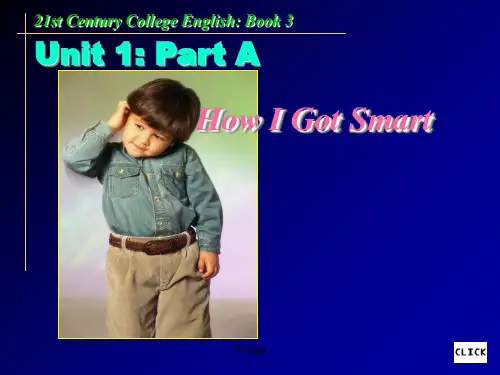
21世纪大学英语读写教程第二册Unit3内容介绍21世纪大学英语读写教程第二册Unit3内容介绍导语:文学翻译家旨在团结各国翻译工作者协会,推动其交流与合作;支持各国成立翻译协会组织;与致力于翻译或跨语言及跨文化交流的其他组织建立联系。
下面YJBYS店铺分享一个关于文学翻译家的英语故事,欢迎阅读!Pre-reading ActivitiesFirst Listening1. As you listen to the tape the first time, fill in the missing parts in the blanks.A) Jack is interested in a job as an ________ manager located in _______.B) His qualifications include _______ years of experience knowing how to use ________.C) He believes that people are _______ everywhere.Second Listening2. What is the disagreement about? Whose opinion do you agree more with? Why?The Tale of a Cultural TranslatorJoint ventures involving Western and Japanese companies often run into conflicts — a multitude of little things that escalate into big emotional battles in which all the parties keep exclaiming: "What's wrong with them!? Can they understand that ...?!" But because the conflicts are mainly due to cultural differences, neither side can understand—unless they have a "cultural translator".The first cultural translator I ever met was an installation engineer, George by name, who worked for an American company where I was the director of international operations.The company had just started a joint venture with a Japanese firm, and the American management needed someone to train the Japanese employees in its unique technology. George's solid understanding of the equipment, its installation and use made him the best-qualified employee for the job, so everyone was happy when George accepted a two-year contract for temporary transfer to Japan.From the start, George was well accepted by all the Japanese employees. Japanese managers often distrust anyone sent to represent US owners, but George was so naturally nonassertive that no one could see him as a threat to their careers. So they felt comfortable asking his advice on a wide range of matters, including the odd behavior of their partners across the ocean. Engineers throughout the company appreciated George's expertise and his friendly and capable help, and they got into the habit of turning to him whenever they had a problem —any problem. And the secretaries in the office were eager to help this nice bachelor learn Japanese.Sooner than anyone expected, the company became a profitable, thriving and growing venture. George's first two-year contract came to an end. By then, he could speak good Japanese, and had picked up Japanese habits. He drank green tea at all hours, ate rice at every meal and had even learned to sit properly on Japanese tatami mats. So when George was offered a second two-year Japanese contract, he accepted at once. Another contract followed, and George's love affair with Japanese culture continued.But as George's sixth year in the country was coming to an end, an unexpected difficulty became apparent: The Japanese engineers had surpassed George in their knowledge of therapidly - changing technology. He had nothing left to teach them.Was this the end for poor George? Was there nothing more he could offer to the now-mature joint venture he had served so loyally? Would he have to leave the country he had come to love? No! Faced with the threat of an unwilling departure from Japan, George reinvented himself as a "cultural translator".The idea came to George one day when the Japanese joint-venture president was — again — offended by a message from the American management. As usual in such situations, he stormed into George's office and threw the message in front of him in a fury. And George, as usual, read the message and explained in his calm manner what the Americans had really meant by it, not what it sounded like in the context of Japanese culture.Fortunately for everyone, both the Japanese and American sides of the joint venture had heard enough horror stories about cultural conflicts to recognize the value of George's skills, so when he proposed this new position for himself, the idea was quickly approved. The wisdom of this decision was proved again and again over the years.At times something far more important than good English was needed. One such case was when the Japanese accountant had to explain the $46,534 spent on 874 December-holiday presents. Or there was the time when the Japanese personnel manager had to justify keeping a chemist on the payroll even though the company no longer needed his expertise. In cases like these, everyone turned to George.Somehow or other, he made their messages sound at least halfway sensible to Americans. And when there was something that even George couldn't "translate" into American - style sense,he would write, "This will sound crazy, but you should go along with it anyway."It worked the other way around, too. When the American managers visited Japan, George accompanied us everywhere to ensure that we didn't do or say anything too stupid from the Japanese viewpoint. Whenever we did that anyway, he came to the rescue at once: "What they really mean is...." Whole multitudes of difficulties never arose thanks to George's skill at smoothing over small conflicts before they became big, emotional and costly.Since leaving that company in George's capable hands, I've advised many firms on international operations. And my first recommendation is always the same: Don't worry about language problems —the first thing you need is a cultural translator.New Wordsjointa. shared, held or done by two or more people 共享的;共有的;共同做的joint venturen. 合资企业conflictn. 1. a state of serious disagreement or argument about sth. important 抵触;争论2. war or battle; struggle 战争;战斗;冲突vi. (with) 冲突;抵触*multituden. a large number of 大批;大量*escalatev. make or become greater or more serious (使)逐步升级;(使)逐步加剧emotionala. 1. having or causing strong feelings (令人)情绪激动的2. concerned with emotions and feelings 感情(上)的;情绪(上)的partyn. a person or group of people involved in an argument, agreement, or other activity, esp. a legal matter (条约、诉讼、争论等中的)一方,当事人exclaimv. speak or say loudly and suddenly, because of surprise or other strong feelings (由于惊讶、痛苦、愤怒、高兴等而)叫嚷,叫喊installationn. 1. 安装;设置2. 装置;设备managementn. 1. the people who control and organize a business or other organization 管理层;管理部门2. 管理;经营equipmentn. the set of things needed for a particular activity 设备;装备qualifieda. having suitable knowledge or qualifications, esp. for a job 胜任的`;合格的qualifyv. (cause to) gain a certain level of knowledge, ability, or performance, or a qualification(使)取得资格contractn. a formal written agreement, having the force of law, between two or more people or groups 合同,契约v. l. 订(约);承包2. 收缩,缩小distrustv. lack trust in; mistrust 不信任;怀疑n. lack of trust; mistrust 不信任;怀疑representvt. 1. act or speak officially for (another person or group of people) 代表2. 象征;体现naturallyad. 1. in a manner to be expected, as a natural result 可预期地,自然地2. according to the nature of sb. or sth. 天生地;天然地nonassertivea. not expressing or tending to express strong opinions or claims 谦虚的;不武断的behavio(u)rn. manner of acting 行为;举止partnern. a person who shares (in the same activity) 合伙人;合作者;伙伴*expertisen. special skill or knowledge in a particular field 专门知识(或技能、意见等),专长*bachelorn. an unmarried man 未婚男子;单身汉*profitablea. producing or resulting in profit or advantage 有利(可图)的,有赢利的;有益的thrivevi. develop well and be healthy, strong, or successful 繁荣;茁壮成长properlyad. 1. suitably, correctly, sensibly 适当地;正确地2. really, actually, exactly 真正地tatamin. (日)榻榻米(指日本人铺在房内地板上的稻草垫)matn. 1. a small piece of carpet or other thick material which is put on the floor for protection, decoration, or comfort 地席;席子2. 垫子apparenta. 1. (to) clearly seen or understood 显然的,明明白白的2. seeming; according to appearance 表面上的*surpassvt. exceed; go beyond in amount, quality, or degree 超过;超越loyallyad. faithfully 忠诚地,忠实地loyala. faithful 忠诚的,忠实的departuren. 1. the act of leaving a place 离开;启程2. turning away from what is planned or what is usually done 背离;违反contextn. 1. the general conditions in which sth. takes place 背景;环境2. what comes before and after a word or sentence which helps to fix the meaning 上下文horrora. (of a story or film) intended to be very frightening (文学作品、电影等)意在引起恐怖的n. a strong feeling caused by sth. extremely unpleasant 恐惧;震惊proposevt. 1. suggest; put forward for consideration 建议;提出2. (as, to be) put forward to be voted on 提名,推荐approver. (of) agree (officially) to 同意,批准accountantn. 会计师personneln. 1.the department in an organization that deals with employees, keeps their records, and helps with any problems they might have 人事部门2. [总称]职员justifyvt. give a good reason for 证明…正当(或有理)*justificationn. a good or proper reason for doing sth. 正当的理由;辩解的理由payrolln. a list of workers employed by a company and the amount of wages each person is to be paid 工资表;在职人员名单sensiblea. 1. reasonable;having or showing good sense 合情合理的;明白事理的2. (of) knowing;aware 知道的;意识到的crazya. 1. (infml.) foolish or strange 愚蠢的;古怪的2. (infml.) wildly excited; very keen or interested 着迷的;热衷的accompanyvt. 1. go with, esp. on a journey 陪同;陪伴2. (fml.) appear or exist at the same time or in the same place as 和…一起发生(存在)ensurevt. (esp. BrE) make (sth.) certain to happen 保证,担保viewpointn. point of view; a particular way of considering or judging a situation, person, event, etc. 观点;看法Phrases and Expressionsrun intounexpectedly begin to experience; meet by chance 意外遇到;偶然遇到a multitude of/multitudes ofa very large number of 许多,众多due tobecause of; caused by 由于,因为by namewith the name of 名叫get into the habit ofdevelop a regular way of doing (sth.) 养成…的习惯come to an end(of sth. which goes on for a while) finish, stop 结束;终了pick upacquire without effort 获得;学会be faced withbe confronted with 面临着(某种情况)at timessometimes; once in a while 有时;间或keep sb. on the payrollkeep sb. employed 使某人留任somehow or otherin one way or another 以某种方式go along withagree with; accept; support 同意;接受;支持the other way aroundin the opposite way 相反地;倒过来;以相反方式thanks toowing to, because of 幸亏;由于;因为smooth overmake (problems or difficulties) seem less serious and easier to deal with 缓和;减轻leave in sb.'s handsgive sb. the responsibility for dealing with sth. 把…交某人管理。
UNIT1 TEXT A我的父亲温斯顿·丘吉尔是在40几岁开始迷恋上绘画的,当时他正身处逆境。
1915年,作为海军大臣,他深深地卷入了达达尼尔海峡的一场战役。
原本那次战役是能够缩短一场血腥的世界大战的,但它却失败了,人员伤亡惨重,为此丘吉尔作为公务员和个人都付出了代价:他被免去了海军部的职务,失去了显赫的政治地位。
“我本以为他会因忧伤而死的。
”他的妻子克莱门泰因说。
被这一不幸压垮的他同家人一起退隐到萨里郡的一个乡间居处---耘锄农场。
在那儿,正如丘吉尔日后所回忆的,“绘画女神拯救了我!”一天他正在花园里漫步,正巧碰上他的弟妹在用水彩画素描。
他观看了她几分钟,然后借过她的画笔,试了一下身手----于是缪斯女神施展了她的魔法。
自那天以后,温斯顿便爱上了绘画。
任何能让沉浸在忧思中的温斯顿分心的事情都让克莱门泰因高兴。
于是,她赶紧去买来她所能找到的各种颜料和画具。
水彩颜料、油画颜料、纸张、帆布画布---很快耘锄农场里便堆满了一个绘画者可能想要或需要的各样东西。
画油画最终成了温斯顿的一大爱好---但是最初几步却出奇地艰难。
他凝视着他的第一块空白画布,异乎寻常地紧张。
他日后回忆道:“我迟疑不决地选了一管蓝色颜料,然后小心翼翼地在雪白的底子上的画上蚕豆般大小的一笔。
就在这时,我听到车道上传来一辆汽车的声音,于是惊恐地丢下我的画笔。
当我看清是谁从汽车里走出来时,更是惊慌失措。
来者正是住在附近的著名画家约翰·莱佛利爵士的妻子。
“‘在画画呢!’她大声说道。
‘多么有趣。
可你还在等什么呢? 把画笔给我---大的那支。
’她猛地用笔蘸起颜料,还没等我缓过神来,她已经挥笔泼墨在惊恐不已的画布上画下了有力的几道蓝色。
谁都看得出画布无法回击。
我不再迟疑。
我抓起那支最大的画笔,迅猛异常地向我可怜的牺牲品扑了过去。
自那以后,我再也不曾害怕过画布。
”后来教丘吉尔画画的莱佛利曾经说起过他这位不同寻常的学生的艺术才能:“如果他当初选择的是绘画而不是政治,他定会成为一位驾驭画笔的大师。
21世纪大学英语读写教程第二册的课文翻译(5-8单元)21世纪高等院校教材作为国家教委组织攻关的项目,正在各高校、各学科中进行酝酿、计划、编写之中。
而21世纪大学英语教材更受人瞩目。
21世纪大学英语读写教程第二册的课文翻译(5-8单元)1987年,普丽西拉·瓦日奎兹一边为高中毕业作准备,一边急切地等待着华盛顿大学的录取通知书,希望自己成为家中读大学的第一人。
当录取通知书送来时,她欣喜若狂。
只有一个问题:华盛顿大学没有为普丽西拉提供助学金。
它只为她提供了一笔数目不大的贷款,并要求她的家庭负担其余的费用。
“我家挣的钱刚够全家生活,但要花那么多钱供我上学却还不够,”她说。
普丽西拉打电话向经济资助办公室咨询。
他们告诉她说,未来的大学生要寻求更多的经济资助,必须与父母分开生活至少两年才符合条件。
在这期间,他们的父母不能在家庭税单上称他们为被赡养人。
“听到这话,我完全惊呆了,”普丽西拉回忆道,“我意识到我必须抽出一些时间去工作,在经济上不依靠父母,然后重新申请入学。
推迟实现我的梦想令人伤心,但这是唯一的选择。
”不到一个月,普丽西拉就在一家餐馆找到了一份工作,并搬到了西雅图贫民区一套低廉的公寓房去住。
她还报名参加了城里的一个职业培训班,学的是秘书专业。
那是一种很难适应的生活方式。
“我早上6点起床,坐很长时间的公交车去学校,下午2点下课,3点开始工作,晚上11点下班,然后回到家就累垮了。
”普丽西拉不久就发现她在餐馆的那份工作的收入还不够她维持生计。
“于是我找到我那幢公寓楼的楼主,问有没有什么清洁工作可以让我做。
他因为同情我,便同意让我每月工作30个小时。
”职业培训班按计划要历时6个月。
但普丽西拉只用了4个月就读完了。
“他们教我各种办公技能和文字处理程序。
我还学会了如何在办公室环境里接电话,以及如何撰写得体的商业函件,”她说。
培训班帮普丽西拉在一家小公司找到了一份秘书工作。
“这是我第一份像样的工作,”她说。